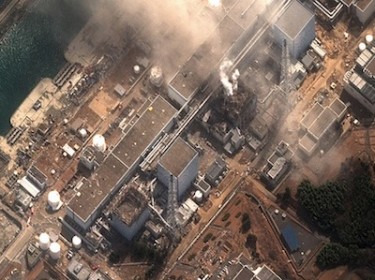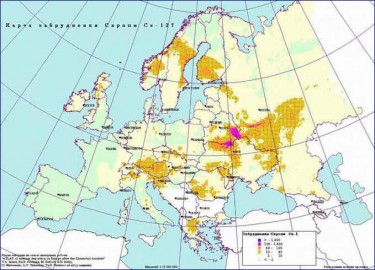This post is part of our special coverage Japan Earthquake 2011.
The natural disaster unfolding in Japan after the 8.9 magnitude earthquake on Friday 11 March, 2011, is currently the one of the most widely discussed topics in the Russian blogosphere. One of the most worrying impacts of the quake and related tsunami has been at the Fukushima nuclear power plant, where it is still unclear if engineers have managed to avoid a major meltdown.
Aside from sharing shocking videos of the quake-induced tsunami levelling streets in Japanese coastal cities and lending an attentive ear to Japan-based tweeps, Russian bloggers have been discussing the question of nuclear energy as the Fukushima disaster plays out hour by hour.

Earthquake and tsunami damaged-Fukushima Dai Ichi Power Plant, Japan. Image by www.digitalglobe.com.
Soviet nuclear legacy
The Soviet Union, Russia's political predecessor, was the first country in the world to develop a nuclear power reactor in 1954. In 1986, the Soviet Union experienced the most powerful nuclear explosion and meltdown in human history in the city of Chernobyl, now located in the Ukraine, resulting in more than 4,000 deaths and the resettlement of 336,000 people.
After the collapse of the Soviet Union in 1991, the heritage of the Chernobyl disaster became shared by Russia, Ukraine, and Belarus, the latter being the most affected (around 25 percent of the territory).
Following Chernobyl, development of new nuclear plants in Russia slowed down, up until mid-2000s when the government decided to increase the share of nuclear energy in the country's energy balance.
In 2010, nuclear plants accounted for 17 percent [ru] of Russia's total energy production, and in March 2010, Russian Prime Minister Vladimir Putin announced the intention [ru] to raise this to 20-30 percent.
Reactions to Fukushima
The Fukushima disaster (see timeline) has not led to any change of heart in Russian nuclear policy. A recent statement by Putin said [ru] that, “Russia will not change its nuclear energy plans due to the disaster in Japan.”

Map of nuclear pollution (Caesium-137) in Europe, 1996 (ten years after the Chernobyl disaster). Map courtesy of Chernobyl.in.ua
After the first Fukushima explosion on March 12, 2011, Vladimir Milov, an energy expert and opposition politician, wrote [ru]:
“Атомщики привычно щеголяют цифрами про вероятность крупной аварии как “десять в минус седьмой” или хотя бы в минус пятой степени. Но вероятность – это математическая величина, а реальные аварии в реальной жизни происходят чаще, чем в математических расчетах. Оно может 100 лет быть безопасным, но потом как обанет один раз – будет достаточно. Убежден, что человечество в ближайшей перспективе ждет как минимум одна крупная атомная авария. С последствиями.”
Это цитата из моего поста, написанного два с половиной года назад.
[…] Для справки: порядка 20% атомных реакторов в мире работают в сейсмически опасных зонах.
[…] В общем, делайте выводы, господа. Да, специально для атомных хомячков, которые сейчас сюда неизбежно прибегут: не надо здесь ля-ля про “обратно в пещеру” и “альтернативная энергетика дорогая”. Пещера и альтернативная энергетика здесь ни при чем. Газ, газ и еще раз газ. Его запасов в мире будет достаточно для покрытия потребления, даже если газом полностью заместить такой маргинальный (менее 6% мирового потребления первичных энергоресурсов) и опасный источник энергии, как “мирный атом”.
“Nuclear energy experts usually show off the data that the probability of a big accident is 0.0000001 or at least 0.000001 to one. But probability is a mathematical value, whereas real accidents happen more often than the calculations predict. It [nuclear energy] can be secure for 100 years but then it will hit once – and once will be enough. I'm convinced, humanity will face at least one big nuclear disaster in the near future. And it will have consequences.”
This is from my post written two and a half years ago.
[…] And for the record: 20 percent of nuclear reactors now work in the seismic active zones.
[…] So, make your conclusions, readers. Especially pro-nuclear trolls who will immediately react: don't bla-bla-bla about “going back to the cave” and “alternative energy is expensive.” Cave [life] and alternative energy have nothing to do with that. Natural gas, gas, and once more – gas. There's enough gas in the world to cover energy consumption and substitute such a marginal (less than 6 percent of world consumption of primary energy resources) and dangerous energy source as the “peaceful atom” [nuclear energy].
Firewind8220 opposes this opinion [ru]:
[…] Сколько можно считать – КПД ядерной реакции и химической отличаются в ТЫСЯЧИ раз. Атомная энергетика выгодна, безопасна, перспективна. Если бы взорвался газовоз с жидким газом, который везет 300К жидкого газа, Хиросима бы позавидовала последствиям. После сегодняшней аварии резервные дизель генераторы перенесут в более защищенные герметичные боксы. А вот куда вы перенесете емкости с газом в сотни тысяч кубометров, это еще вопрос. […] Да, кстати, а вы представляете каковы бы были последствия, если на месте атомных станций там бы стояли газовые или нефтяные? Пример мексиканского залива и 1 млн тонн нефти в океане ни чему не учит? Сколько тысяч людей от последствий такого разлива умрут не скажите? А с газом не намного все проще и безопаснее. Так что нее надо паники – учимся на ошибках своих и чужих. Атомной промышленности быть.
Oleg Kozyrev, who once visited radiation polluted territories close to Chernobyl, wrote:
Япония — из тех стран, которым действительно трудно или даже невозможно было обойтись без ядерной энергии. Но недавние события показали, что угроза от атомных станций может быть сравнимой с угрозой от цунами и землетрясений. Если японцы смогут развязать эту энергетическую удавку на своей шее, то может быть их решения помогут и всему человечеству.
Я не являюсь противником ядерной энергии. Но в то же время понимаю, что бесконечно закрывать глаза на угрозы, от этого вида электроэнергетики исходящие, больше нельзя. Задайте себе один простой вопрос – насколько мы уверены в безопасности наших, российских электростанций. Еще раз, говорю не в мантрах российских атомщиков, а именно о реальном положении дел.
Japan is one of those countries that can't go without nuclear energy. But the latest events have shown that the danger from the nuclear plants can be comparable to those from tsunamis or earthquakes. If Japanese can loosen this energy noose around their neck, then maybe their solutions will help humanity in general.
I'm not against nuclear energy. But at the same time I think that it's impossible anymore to close our eyes on the threats that exist from using this type of power. Ask yourself a simple question – how secure do we feel about our Russian [nuclear] electricity plants? One more time, I'm not speaking about the mantras of Russian nuclear experts but about the real situation.
Bquark commented:
А как обойтись при нынешнем адском уровне потребления энергии без ядерных станций? Если от них отказаться, но уровень потребления будет тот же, то придется задействовать угольную и гидроэнергетику в такой степени, что последствия будут печальными (они уже печальные).
Проблема в потреблении, а не виде энергии.
А еще в том, что большинство думает, что каждая станция это потенциальный Чернобыль.
Но это ведь не так? Водо-водяные реакторы в принципе не могут так взрываться как Чернобыль.
How would you avoid using nuclear power stations given such a demanding level of energy consumption? If you refrain from using nuclear energy, the level of consumption would be the same, so you would have to use coal-powered and hydroelectric energy to such a degree that the consequences would be bad (they're bad already).
The problem is the level of consumption and not the type of energy.
And also, the problem is that the majority think that every station is a potential Chernobyl. But isn't it different? Boiling Water Reactors (BWR) can't explode the same way Chernobyl did.
Finally, Igor Podgorny, famous photo-blogger and Greenpeace activist, has pointed out [ru] a different aspect of the problem: Russia's plans to build floating nuclear plants (the first was finished in July 2010) in its seismic- and tsunami-prone Pacific coastal zone. At the same time, the country's Kamchatka region, where the floating nuclear station is planned to be built, actually boasts the best conditions for geo-thermal energy production.
Monitoring the situation
Now Russians, together with the rest of the world, are closely watching the situation around Fukushima power station. Unlike Moscow-based bloggers, people in the east of the country are mostly focused on whether a ‘nuclear fallout cloud’ exists, and if yes, whether it will reach them or not.
Internet users in Vladivostok, the biggest Russian city close to Japan, have written almost 2,000 comments [ru] in answer to a single article about the Fukushima explosion, posting online radiation data captured by personal radiation dosimeter equipment in differents parts of the city. Members of the Kamchatka and Sakhalin online forums have done the same. For the time being one observation has been shared: the radiation level is normal.
Whether any impact from Fukushima reaches Russian territory or not, the issue of nuclear energy remains wide open. The topic is complex with no simple solution, yet bloggers, journalists and scientists are eager to spend hours discussing it.
But is the Russian government and parliament as enthusiastic to join the debate?
This post is part of our special coverage Japan Earthquake 2011.








4 comments
hello Alexey, i just would like you to watch this video.
http://www.youtube.com/watch?v=tH7JYAphuTE
this video said “Stop the hysteria”.